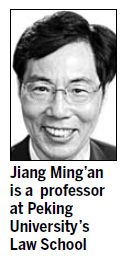A different look at demolitions

Jiang Ming'an and four other scholars from Peking University's Law School submitted a suggestion to the National People's Congress at the end of 2009 to review the Regulation on the Dismantlement of Urban Houses. Later, the Legal Affairs Office of the State Council, China's Cabinet, released a draft to solicit public opinion on the regulation on expropriation of houses on State-owned land and related compensation.
After waiting for more than half a year, Jiang and the other scholars told the media that they were unhappy with the stagnation of the regulation's revision process. The public got the second draft for comment only at the end of 2010. That the second draft took a year to be completed, unprecedented in China, shows the strong resistance the revision faces.
As professors of law, Jiang and his colleagues saw their suggestion as a way of doing "something" for people like Tang Fuzhen, who committed self-immolation in protest against the forcible demolition of her house in 2009.
Jiang, who has been studying administrative law for more than 20 years, says demolitions are crucial to urbanization and economic development. Local governments emphasize the role of demolition, because it is closely related to investment and GDP growth and can influence key issues such as employment, social welfare and social security. No wonder, some demolitions are carried out in the name of economic development, provoking severe conflicts.
According to a People's Daily report, the 1994 tax-sharing reform saw local governments' share in the country's financial revenue dropping from 78 percent in 1993 to 42.7 percent in 2004. Their proportion of expenditure, however, remained around 70 percent. Hence, land-based finance became the largest and most stable source of local governments' financial revenue.
Official figures show that local governments earned about 1.6 trillion yuan ($242.13 billion) by transferring land-use rights in 2009, or about 46 percent of their financial revenue. The figure could be more than 2 trillion yuan for 2010.
Besides, there is a conflict of interests between local officials and ordinary people. To enhance their political performance, some local officials promote demolitions even at the cost of sacrificing people's interests. Residents, on the other hand, think they deserve reasonable compensation for their houses and try their best to get it. But when they fail in their endeavor, they try all means to resist the demolition.
Jiang says the regulation's second draft has made some significant progress. The five scholars had suggested three main revisions: Compensation should be settled before demolition; the government has to expropriate land and compensate people for demolitions, and the legal relation of dismantlement and compensation should be defined as administrative legal relation; and legal expropriation should always precede demolition. The second draft has adopted all the three suggestions.
Making the government responsible for expropriation of land and compensating people is necessary to avoid violent demolitions, because a majority of the tragedies have taken place when real estate developers have tried to demolish buildings forcibly. Jiang says the government has also made headway in the part on compensation. "The range and standards of compensation both have improved."
 0
0 







Go to Forum >>0 Comments